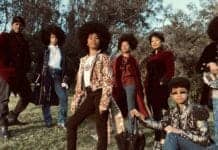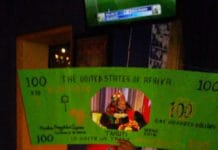Reveries of Abbey Lincoln
by Playthell Benjamin

When Max married Abbey, she instantly became something of a Goddess in my mind. And since I had already rejected the God people around me worshiped, I was free to pick and choose my own Gods: So why not them? I had never heard of Abbey before she married Max, but they quickly became the first couple of the Black Arts Movement. Teasing brown and strikingly beautiful, she was well spoken, a talented singer and actress, and carried herself like an African warrior queen prepared to do battle in defense of her own freedom and dignity, and by word and deed that of her people.
Although her fame would have been restricted by white racism – a white girl with her attributes would have blown up as big as ice cream – she still could have found commercial success. But Abbey was committed to higher goals, like the liberation and elevation of her oppressed people; once you experience that freedom high nothing can compare with it. Many years later Abbey was still unrepentant about her decision. In a 1992 Essence magazine interview, she told Jill Nelson: “People make you over, they give you other songs to sing, you wear the clothes they choose, they find you a personality they think will sell. It’s all about prostitution, when you come down to it.”

However, unlike Lena and Dorothy, who allowed their images and career paths to be molded by white producers and public relations experts, Abbey chose a different role for herself and rejected the superficiality of pop fame in favor of becoming a serious artist in the complex Afro-American art music called jazz. This was a risky business compared to the instant stardom and the spoils that come with it if one achieves success in pop music or the movies.

The apotheosis of that collaboration was the “Freedom Suite,” which was recorded as “We Insist: Freedom Now!” in 1960. It was a prophetic work of art that presaged the militant struggles that would mark the decade and scared a lot of the white cultural critics to death. With music by Max Roach, who had a degree in composition from the Manhattan School of Music, and lyrics by the great Chicago song poet and musical dramatist Oscar Brown Jr., the album was electrifying. Listening to it now, I hear echoes of the era, a sound portrait of one of the most dynamic periods in American history.
It is no exaggeration to say that the events of the 1960s reshaped the way millions of Americans view their country. Everything from the way we treat the environment to gender relations, and even the definition of gender itself, were called into question as a result of the Afro-American assault on the racial caste system and the cultural redefinition inspired by that movement. The freedom suite gave artistic expression to that ferment.
On compositions like “Driva Man,” “Tears for Johannesburg” and “Triptych: Prayer / Protest / Peace,” the power of Abbey’s soulful contralto voice gives life to Max’s music and power to Oscar’s poignant lyrics. The dramatic timbres and dark indigo colors of her voice embody all the pathos of the experience the compositions describe in words and music. Given her talents as an actress, Abbey was the ideal artist for this project, which often required her to assume the dramatis personae suggested by the lyrics she sang. “Triptych,” which is just Max on drums and Abbey’s vocalese, is blood curdling: No one can listen to it and not be moved.

“I just stood next to the stage, holding my camera in my hand but not raising it to shoot. I was mesmerized. Abbey Lincoln was riveting. I was stunned. I literally just stood there. I’m sure my mouth was hanging agape.” He goes on to explain: “Abbey and Max made me believe in time travel, believe in the power of a secular Holy Ghost, a terrible Shiva-force that destroyed you to renew you. I was afraid for her – and for myself also. It seemed as though she might hurt herself. It seemed as if I should do something helpful and not just be a stationary stump while she was going through this. This was not just jazz. This was a religious experience. A new way to live.”
***********
Max and Abbey split up after a decade of marriage and an even longer period of collaboration. Max never worked with a singer on a regular basis again and Abbey went her own way, but she has been clear about the role Max played in the artistic path she took. In a 1970 interview with Gallery 41, Abbey recalled: “I was in New York, miserable because I was working supper clubs but I wasn’t expressing myself. I was really unhappy with my life. I saw Max again and he told me I didn’t have to do things like that. He made me an honest woman on the stage. I have been performing in that tradition since. I feel that I’m a serious performer now, whereas then I wanted to be but I didn’t know how.”

Born in Chicago in 1930, during the Great Depression, Abbey Lincoln, whose given name at birth was Anna Marie Wooldridge, was raised in rural Michigan as the 10th of 12 children. She was a woman who reinvented herself several times before she finally became Aminata Moseka. In an interview with Lara Pellegrinelli, she explained her fantastic journey from Anna Marie to Aminata:
“I’m Aminata Moseka. I got a bunch of names. Anna Marie Wooldridge was the name I was born with. Then I took Gaby because the people at the Moulin Rouge in Los Angeles wanted me to have a French name. They didn’t know I already had one. I didn’t either. Anna Marie is as French as it gets. And Wooldridge is English. They gave me Gaby and kept Wooldridge so I had a German and an English name. It’s America! [laughs] And then Bob Russell named me Abbey Lincoln, because we used to sit and talk about life. He understood how I felt about my people because he felt the same way about his. He said to me, ‘Well, since Abraham Lincoln didn’t free the slaves, maybe you could handle it.’ Named me Abbey Lincoln and I laughed, but that’s the name that I took. Abbey for Westminster Abbey, he told me, and Lincoln for Abraham Lincoln. He was aware of his self and of his people – socially aware. He’s the first socially aware person that I met. Bob Russell. Roach is socially aware. Duke Ellington, all of the great ones.”


Max and Abbey in performance
In addition to Abbey Lincoln and Max Roach, the musicians are Eddie Kahn on bass, Clifford Jordan on sax and Coleridge Perkins on piano.
Abbey in ‘Nothing But a Man’
“Nothing But a Man” is a 1964 movie about a Black man in the South who wants to be treated as “nothing but a man,” instead of a “boy.” It stars Ivan Dixon, Abbey Lincoln, Julius Harris, Gloria Foster, Martin Priest, Leonard Parker and Yaphet Kotto. The movie, which was written by Michael Roemer and Robert M. Young and directed by Roemer, has been deemed “culturally significant” by the Library of Congress and selected for preservation in the United States National Film Registry.

 Store
Store








